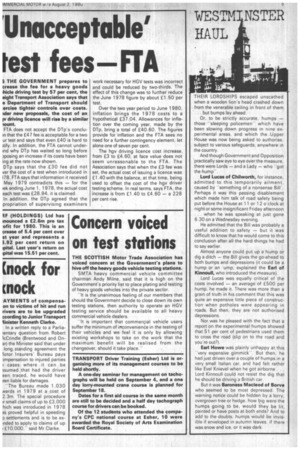THEIR LORDSHIPS escaped unscathed when a wooden lion's head crashed
Page 7

If you've noticed an error in this article please click here to report it so we can fix it.
down from the venerable ceiling in front of them . . . but bumps lay ahead.
Or, to be strictly accurate, humps — those "sleeping policemenwhich have been slowing down progress in nine experimental areas, and which the Upper House was now being asked to authorise, subject to various safeguards, anywhere in the country.
And though Government and Opposition 'practically saw eye to eye over the measure, there were Lords — and a Lady — who "got the hump-.
Lord Lucas of Chilworth, for instance, admitted to this temporarily ailment, caused by "something of a nonsense Bill'. Perhaps it was this passing disablement which made him talk of road safety being put before the House at 11 or 12 o'clock at night or some insignificant Friday afternoon . . when he was speaking at just gone 6.30 on a Wednesday evening.
He admitted that the Bill was probably a useful addition to safety — but it was difficult to know that he would come to this conclusion after all the hard things he had to say earlier.
Almost anyone could put up a hump or dig a ditch — the Bill gives the go-ahead to both bumps and depressions (it could be a hump or an 'Limp, explained the Earl of Kinnoull, who introduced the measure).
Lord Lucas was equally critical of the costs involved — an average of £500 per hump, he made it. There was more than a grain of truth in his comment that this was quite an expensive little piece of construction when potholes were appearing in roads. But then, they are not authorised depressions.
Nor was he pleased with the fact that a report on the experimental humps showed that 51 per cent of pedestrians used them to cross the road (slip on to the road and you're out?)
Earl Howe was plainly unhappy at this "very expensive gimmick-. But then, he had just driven over a couple of humps in a very small Italian car, and had felt rather like Evel Knievel when he got airborne . . Lord Kinnoull could not resist the dig that he should be driving a British car.
But it was Baroness Macleod of Borve who seemed to be most depressed. The warning notice could be hidden by a lorry, overgrown tree or hedge, how big were the humps going to be, would they be lit, painted or have posts at both ends? And to add to the•doubts, humps would be invisible if enveloped in autumn leaves, if there was snow and ice, or it was dark.




























































































